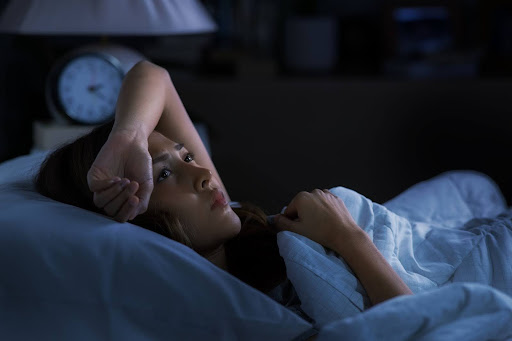Insomnia’s a real challenge, isn’t it? It affects so many people, keeping them up at night and turning what should be a restful time into hours of frustration. We’ve come across something pretty interesting that might change the game for those battling sleepless nights: Transcranial Magnetic Stimulation (TMS) therapy.
This isn’t your usual sleep aid or therapy technique, although those can be helpful. This is a groundbreaking approach that uses magnetic fields to directly stimulate parts of the brain. TMS for insomnia is gaining attention as a potential treatment, offering a unique way to address the sleep disruptions many face. By focusing on certain areas of the brain, TMS insomnia treatments aim to improve sleep patterns in a safe and non-invasive manner.
We’ve compiled a detailed guide to explore how TMS works as a potential solution for insomnia. This could be a major breakthrough for people who have had little luck with traditional treatments or have had some success but are looking for better results.
So, grab a cup of coffee, settle in, and let’s walk through this exciting development together. Whether it’s revolutionizing treatment options or simply offering a new ray of hope, it’s worth taking a closer look to see how this technology could help turn those endless tossing and turning nights into peaceful slumber.
Understanding insomnia
Insomnia is not merely a single night of tossing and turning, but rather a persistent sleep disorder. It manifests as the inability to fall asleep, stay asleep, or experience poor-quality sleep, none of which are fun.
Insomnia often leads to daytime fatigue and mood disturbances. People suffering from it might also have trouble focusing on daily tasks.
As a result, if you have insomnia, you’ll often wake up feeling tired, groggy, and unrefreshed, hampering your ability to function optimally during the day.
Now, this sleep disorder can arise from various factors, ranging from psychological to physiological. Stress, anxiety, depression, and traumatic events all contribute to insomnia. Additionally, poor sleep habits, irregular work schedules, caffeine or nicotine intake, and certain medications disrupt the delicate balance of sleep.
Understanding the sleep-wake cycle
To truly grasp the complexities of insomnia, let’s delve into the fascinating world of our innate sleep-wake cycle. Our bodies have a built-in biological clock, also known as the circadian rhythm, which regulates our sleep and wakefulness patterns. When this rhythm gets disrupted, it leads to trouble falling asleep or maintaining proper sleep throughout the night.
Impact of insomnia on health
Insomnia isn’t simply an inconvenience that leaves us feeling tired. It can have significant implications for our overall health. Studies have suggested that chronic insomnia is associated with an increased risk of developing conditions such as high blood pressure, heart disease, diabetes, and even mental health disorders. Clearly, this sleep disorder deserves our attention.
Traditional treatments for insomnia
Historically, treating insomnia has primarily involved behavioral or pharmacological interventions. This includes adopting good sleep hygiene practices, cognitive-behavioral therapy, or resorting to sleep aids. However, these approaches may not always be effective for everyone, and some individuals may experience unwanted side effects from medications.
Enter TMS: A promising frontier for insomnia treatment
TMS has traditionally been recognized for its efficacy in treating depression, but recent research has unveiled its potential in addressing sleep disorders, too.
Understanding TMS
TMS is a noninvasive procedure that uses magnetic fields to stimulate specific areas of the brain. This stimulation helps regulate brain activity and improve the communication between different brain regions involved in sleep regulation.
By targeting regions like the prefrontal cortex, which plays a vital role in sleep-wake regulation, TMS may offer a unique approach to treating insomnia at its core.
The science behind TMS and insomnia
Emerging studies have demonstrated impressive results in utilizing TMS as an effective treatment for insomnia. By modulating brain activity, TMS promotes the reestablishment of normal sleep patterns, improving sleep quality and overall well-being.
TMS has shown considerable promise in reducing the time it takes to fall asleep and decreasing the frequency of nighttime awakenings.
The advantages and considerations
One of the significant advantages of TMS as an insomnia treatment is its non-invasive nature. Unlike medications, TMS doesn’t involve any reliance on pharmaceutical substances, reducing the risk of addiction or unpleasant side effects.
The idea behind TMS therapy is that, by targeting specific brain regions, we can modulate neural activity and potentially alleviate the symptoms associated with various disorders, including insomnia.
Now you might be wondering, how does this magnetic stimulation actually work? Well, during a TMS session, an electromagnetic coil is placed against the scalp, usually over the prefrontal cortex – an area of the brain involved in sleep regulation.
When the coil is activated, it generates a magnetic field that passes through the scalp and skull, reaching the underlying brain tissue. This magnetic field then interacts with the electrical currents in the brain, causing the neurons in the targeted area to become more or less active, depending on the desired effect.
When it comes to insomnia, TMS therapy has shown promising results in improving sleep quality and reducing the time it takes to fall asleep. By stimulating specific brain regions involved in sleep regulation, TMS helps restore the natural balance and rhythm of sleep cycles.
One interesting thing to note is that TMS therapy is considered a localized treatment, meaning that it affects only the targeted brain regions without influencing the rest of the brain. This selective targeting is one of the reasons why TMS has garnered attention as a potential treatment for various conditions, including insomnia.
Benefits of TMS for insomnia patients
1. Non-invasive and gentle
Imagine a treatment that could potentially alleviate insomnia symptoms without the need for surgeries or chemical interventions. That’s precisely what TMS offers!
By applying magnetic fields to specific areas of the brain associated with sleep regulation, TMS stimulates neural activity, helping to address the underlying causes of insomnia. It’s a noninvasive, painless procedure that requires no anesthesia or needles, making it an ideal choice for those wary of invasive treatments.
2. Targeted approach
One remarkable advantage of TMS is its ability to precisely target the areas of the brain that contribute to insomnia symptoms. TMS can focus its effects on the prefrontal cortex and other relevant brain regions involved in sleep regulation by strategically placing an electromagnetic coil on the scalp.
This targeted stimulation encourages the release of neurotransmitters and rebalances brain circuits that influence sleep patterns, leading to improved sleep quality and duration.
3. Effective for treatment-resistant cases
Insomnia is sometimes stubborn, making it challenging to find a suitable treatment option. That’s where TMS comes to the rescue! This remarkable technique has shown promising results in patients who have previously struggled with treatment-resistant insomnia.
Treatment-resistant insomnia refers to sleep disorders that persist despite attempts to treat them through conventional methods. Typically, this form of insomnia remains unresponsive to lifestyle changes, sleep hygiene improvements, and over-the-counter or prescription sleep aids.
Patients with treatment-resistant insomnia may have tried multiple therapies, such as cognitive-behavioral therapy for insomnia (CBT-I) and medications like benzodiazepines or non-benzodiazepine hypnotics, without significant improvement.
This type of insomnia can be particularly challenging, as it often affects daily functioning and overall quality of life, leading sufferers to seek more advanced and specialized interventions like TMS to manage their condition effectively.
By directly impacting the brain’s neural networks, TMS provides a fresh approach, often leading to breakthrough moments for individuals who have felt trapped in their exhausting insomnia cycle.
4. Minimal side effects
Compared to other treatment options, TMS has relatively few side effects, and they are typically mild and temporary. Some individuals may experience mild scalp irritation or a slight headache during or after the procedure, but these effects tend to subside with time.
The lack of major side effects makes TMS a favorable choice, particularly for those sensitive to the adverse effects of medications.
5. Enhanced overall well-being
It’s not only about improving sleep; TMS has shown potential in enhancing overall well-being and mental health in insomnia patients. The correlation between insomnia and various mental health conditions, such as depression and anxiety, is well-established.
By effectively treating insomnia, TMS indirectly impacts these associated conditions, leading to improved mood, reduced anxiety, and an overall better quality of life.
6. Long-lasting effects
Perhaps one of the most appealing aspects of TMS is its ability to provide long-lasting relief. Multiple studies have demonstrated improvement during TMS treatment and sustained benefits that persist well beyond the treatment period. This long-lasting effect allows individuals to reclaim their lives, bid farewell to sleepless nights, and embrace revitalized health and vitality.
Potential side effects and considerations
Like any medical treatment, TMS does come with a few possible side effects and considerations you should be aware of.
1. Headaches
One of the most common side effects reported by patients undergoing TMS is mild to moderate headaches. These headaches usually occur during or immediately after the treatment session.
However, it’s important to note that these headaches are typically short-lived and tend to lessen with subsequent sessions. Your doctor can prescribe over-the-counter pain relievers to help manage them, so don’t worry too much!
2. Scalp discomfort
Some people may experience scalp discomfort or tenderness at the treatment site. You might feel a sensation similar to having a rubber band snapped against your scalp. Again, this sensation is usually mild and temporary. If it becomes bothersome, let your doctor know; they can adjust the TMS device to minimize discomfort.
3. Muscle twitching
During TMS, it’s not uncommon to experience muscle twitching in the face, jaw, or scalp. Now, I know this might sound alarming, but it’s actually a normal response to the stimulation. It doesn’t indicate any serious issues and usually subsides after the session. However, if the twitching persists or worsens, inform your doctor so they can assess it further.
4. Seizure risk
This is a consideration rather than a side effect. TMS does carry a very low risk of inducing seizures, particularly in individuals who already have an underlying seizure disorder.
However, it’s crucial to note that the likelihood of experiencing a seizure during TMS for insomnia is extremely rare. Your doctor will thoroughly evaluate your medical history to ensure the treatment is safe.
5. Cognitive effects
While TMS is generally well-tolerated, some individuals may experience temporary changes in cognitive function, such as difficulties with attention, memory, or concentration. These effects are usually mild and short-term, resolving within minutes to hours after the session.
Remember, TMS targets specific brain areas involved in insomnia, and any cognitive changes are unlikely to be long-lasting.
6. Discomfort during treatment
During TMS sessions, you’ll be required to sit still for a duration of time with a device placed near your head. While most people find it tolerable, a few may find it uncomfortable to be in the same position for an extended period. If this becomes an issue for you, speak up! Your doctor can make adjustments to enhance your comfort during the treatment.
It’s crucial to emphasize that TMS is a well-studied, FDA-approved treatment with a favorable safety profile. The majority of patients experience only mild, transient side effects, and the potential benefits of treating insomnia often outweigh these considerations.
As always, it’s critical to discuss any concerns or questions with your healthcare provider before undergoing TMS.
Combining TMS with other treatments
Insomnia is a complex sleep disorder that can be caused by various factors, such as stress, anxiety, depression, and even certain medical conditions.
With its ability to directly target and modulate specific brain regions responsible for sleep regulation, TMS has proven to be a game-changer in treating insomnia. But what if we could supercharge its effectiveness by combining it with other tried and tested therapies? Let’s find out!
1. Cognitive Behavioral Therapy for Insomnia (CBT-I)
CBT-I is an evidence-based psychological treatment that aims to address the underlying thoughts and behaviors contributing to insomnia. Combining TMS with CBT-I creates an incredibly powerful duo.
TMS helps adjust the brain’s neural pathways, while CBT-I equips individuals with coping strategies, relaxation techniques, and tools to reframe negative thoughts. This combined approach fosters long-term change by tackling both the physical and psychological components of insomnia.
2. Medication management
While TMS offers a non-invasive, medication-free approach to treating insomnia, it doesn’t necessarily exclude the simultaneous use of appropriate sleep medications.
In fact, combining TMS with certain medications under a medical professional’s guidance can enhance the therapeutic effect.
By reducing the reliance on medication alone, TMS can potentially decrease the dosage or even help phase out medication usage over time, minimizing side effects and promoting overall well-being.
3. Sleep hygiene and lifestyle modifications
Optimizing sleep hygiene and implementing lifestyle modifications can significantly complement the effects of TMS. Sleep hygiene practices include establishing a consistent sleep schedule, creating a calming bedtime routine, avoiding stimulants (i.e., caffeine and electronic devices) before bed, and creating a sleep-friendly environment.
By incorporating these practices alongside TMS sessions, individuals can maximize the benefits of TMS treatment and improve sleep quality even further.
4. Mindfulness and relaxation techniques
Mindfulness-based practices, such as meditation and deep breathing exercises, have shown promising results in promoting relaxation, reducing anxiety, and easing insomnia symptoms.
Luckily, TMS treatments themselves provide an ideal opportunity to practice mindfulness, as sessions involve sitting in a comfortable position for an extended period. Learning and integrating mindfulness and relaxation techniques with TMS enhances the overall efficacy of treatment, fostering a calmer, more restful state of mind.
Remember, my friend, the power lies in the combination. By intertwining TMS treatment with other therapeutic approaches, its potential to overcome insomnia reaches new heights. Seeking expert guidance, such as psychiatrists, psychologists, and sleep specialists, is crucial to finding the most suitable combination for individual needs.
As exciting as this sounds, it’s essential to note that the effectiveness of combining treatments may vary depending on each person’s unique situation. What works for one may not be as effective for another. That’s why consulting with healthcare professionals is essential to develop a personalized treatment plan tailored to specific needs and goals.
Brain Health Center is here to help
If you’re ready to explore a promising new avenue for conquering those frustrating, sleepless nights caused by insomnia, look no further than TMS therapy at Brain Health Center. We’re here to guide you through every step of this innovative therapy, designed to help you find the restful sleep you’ve been missing.
At Brain Health Center, our dedicated team of experts is committed to providing personalized care, using state-of-the-art technology to ensure the best possible outcomes. TMS could be the breakthrough you need to finally overcome insomnia and regain control over your sleep.
Don’t let another restless night pass you by. Contact us today to schedule a consultation and learn more about how TMS therapy at Brain Health Center can help you achieve the restorative sleep your body and mind deserve.
Take the first step towards a better night’s sleep and a healthier, more vibrant life. Your journey to better sleep starts here, with us at Brain Health Center.

